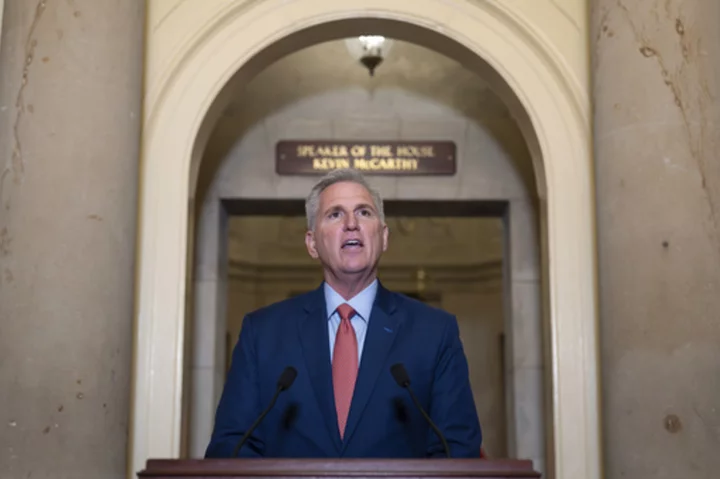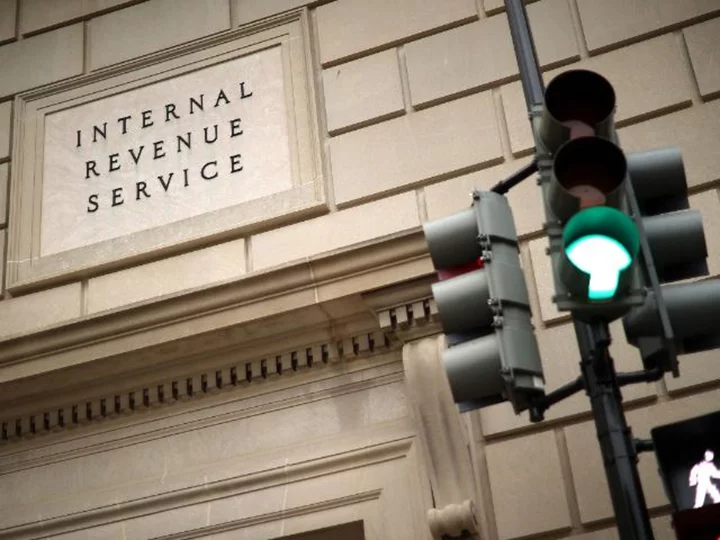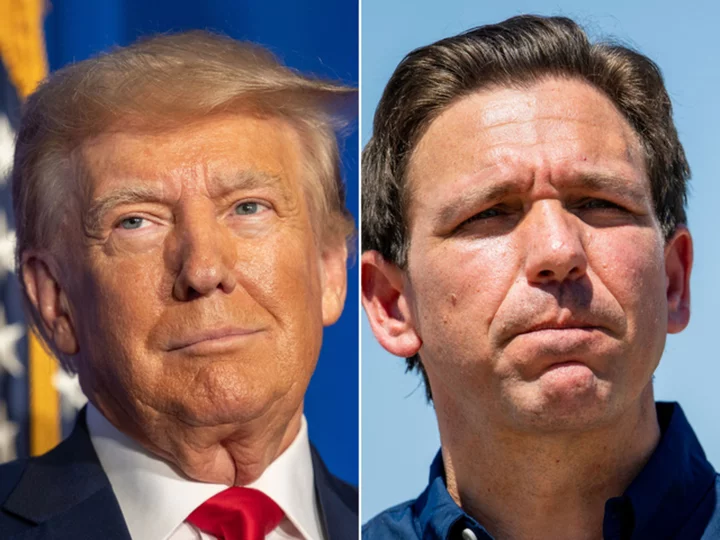WASHINGTON (AP) — House Speaker Kevin McCarthy said he is launching an impeachment inquiry against President Joe Biden, yielding to mounting pressure from former President Donald Trump and his allies in what's shaping up as an election-year clash between Congress and the White House.
In a statement Tuesday, McCarthy said the House investigations into the Biden family this year have uncovered a “culture of corruption” that demands deeper review.
"These are allegations of abuse of power, obstruction and corruption," McCarthy said.
McCarthy said he will direct the chairmen of the House Judiciary, Oversight and Ways and Means committees to lead the impeachment inquiry. The panels have been working together for months on various probes related to the Biden family.
A look at what happens next as House Republicans inch closer to possible impeachment charges against Biden:
WHAT IS AN IMPEACHMENT INQUIRY?An impeachment inquiry is an investigation of possible wrongdoing by a federal official, such as the president of the United States, Cabinet officials or judges. The process is written into the Constitution and is the most powerful check that Congress has on the executive branch.
While the House of Representatives wields the power to impeach a federal official, only the Senate has the ability to convict and remove an individual from office.
To date, no president has ever been forced from the White House through impeachment. But former Republican President Richard Nixon resigned in 1974 as the House was preparing to take a vote on impeachment articles against him.
WHY ARE REPUBLICANS PURSUING IT AGAINST BIDEN?Since gaining the House majority in January, House Republicans have aggressively investigated Biden and his son, claiming evidence that they engaged in an influence peddling scheme. The allegations echo those that former President Donald Trump has made for years against Biden and his family.
Republicans have focused much attention on an unverified tip to the FBI that alleged a bribery scheme involving Biden when he was vice president. The bribery claim, which emerged in 2019 and was part of Trump's first impeachment, relates to the allegation that Biden pressured Ukraine to fire its top prosecutor in order to stop an investigation into Burisma, the oil-and-gas company where Hunter Biden was on the board.
Democrats have reiterated that the Justice Department investigated the Burisma claim when Trump was president and closed the matter after eight months, finding “insufficient evidence” to pursue it further. Other countries were also pushing for the firing of the Ukrainian official, viewing him as corrupt. And a former business partner of Hunter Biden's has testified to Congress that the bribery allegation is untrue.
Nonetheless, three House committees have been pursuing lines of inquiry related to the president and his son, including the ways that Hunter used the “Biden brand” to advance his business with foreign clients. They've also delved deeply into the Justice Department investigation into the younger Biden, citing whistleblower testimony, to suggest that Hunter has received special treatment.
And while Republicans have sought to directly connect Hunter Biden's financial affairs to his father, they have failed to produce evidence that the president directly participated in his son's work, though he sometimes had dinner with Hunter Biden's clients or said hello to them on calls.
DOES THIS MEAN THAT BIDEN WILL BE IMPEACHED?Not necessarily. While all inquiries opened in recent history have resulted in the impeachment of a president, Republicans have been treading carefully around the term and its potential political implications.
To impeach Biden, the House would have to approve at least one impeachment charge against him, which requires a majority vote. An impeachment inquiry can also be closed without charges being brought.
McCarthy has said an impeachment inquiry is necessary to ensure Congress can use the full weight of its oversight authority to pursue its investigation of the Biden family.
“Everyone should understand, impeachment is not the goal,” Rep. Darrell Issa, a senior Republican on House Judiciary Committee, one of the panel's tasked with investigating Biden, told reporters recently. “Impeachment is a way of saying this is not a legislative oversight, but in fact an oversight of possible wrongdoing.”
Regardless, the inquiry will loom over Biden as the probe potentially drags into next year when the president, who is running for reelection, confronts a Republican field led by Trump, who was impeached twice.
WHAT EVIDENCE DO THEY HAVE?House Republicans — led by Rep. James Comer, the chairman of the House Oversight Committee — have obtained thousands of pages of financial records from various members of the Biden family and their associates through subpoenas to the Treasury Department and various financial institutions.
Comer has repeatedly claimed — without substantial evidence — that there is enough in those documents to draw a clear line between Hunter Biden trading on his father's name and policy decisions Biden made while vice president. No such connection has been proven.
Comer also joined forces in June with the Republican chairmen of the Judiciary, and Ways and Means committees to launch a larger investigation into the yearslong Justice Department probe of Hunter Biden. The FBI and IRS have been investigating Hunter Biden for years and the case appeared headed toward a plea deal this summer until a judge rejected the terms of that agreement.
The breakdown happened after two IRS agents claimed in congressional testimony that the Justice Department improperly interfered in the case, which was first opened in 2018.
Attorney General Merrick Garland last month appointed the prosecutor investigating Hunter Biden as a special counsel, likely extending the investigation further.
HOW WILL THE IMPEACHMENT INQUIRY WORK?McCarthy said he's asked Comer to take the lead on the impeachment inquiry, working alongside House Judiciary chairman Jim Jordan, R-Ohio, and House Ways and Means Chairman Jason Smith, R-Mo.
While McCarthy had previously said the House would hold a vote to launch the inquiry, he made no such promise on Tuesday.
The Constitution does not require a vote to start an impeachment inquiry, and neither do the rules governing the House. But authorizing resolutions have been passed in previous presidential impeachments.
It's not clear McCarthy would have enough votes in the House to approve an impeachment resolution. Some House Republicans are opposed to launching an inquiry, saying there is insufficient evidence against the president.
Once an impeachment inquiry is complete, the House has traditionally tasked the Judiciary Committee — the panel authorized to introduce articles of impeachment — to hold hearings and draft impeachment charges.
HOW LONG WILL THE INQUIRY TAKE?There are no rules to how long an impeachment inquiry can or must last. The probe into Biden could last as short as a few months or as long as a year, depending on what McCarthy and Republican leadership believe is the right time to conclude or move to articles of impeachment.
The only real deadline would be the end of this Congress, which is Jan. 2, 2025.
WHAT HAPPENS IF REPUBLICANS DO DECIDE TO IMPEACH?If Republicans decide there is enough evidence of wrongdoing and abuse of power by Biden to move forward, the Judiciary Committee would likely mark up the articles of impeachment. If those articles are voted out of committee by a simple majority, it would come to the House floor where a majority vote would be required to impeach Biden.
Only three other presidents have been impeached: Andrew Johnson, Bill Clinton and Trump, who was impeached twice.
The impeachment charges would then move to the Senate, where Democratic leaders would likely have no choice but to hold a trial.
The trial is similar to what's seen in the legal system, with the senators acting as jurors and select House members acting as prosecutors, or impeachment managers. The chief justice of the Supreme Court presides over that process. If the Senate approves an article of impeachment with a two-thirds vote of “guilty,” the president is convicted and removed from office. If all the articles are rejected, the president is acquitted.
If Biden were convicted by the Senate, he would be the first president to ever be removed from office. But such an outcome seems far-fetched, given that Democrats have a 52-48 majority.









